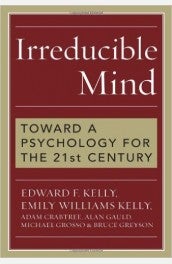Irreducible Mind: Toward a Psychology for the 21st Century
Edward F. Kelly, Emily Williams Kelly, Adam Crabtree, Alan Gauld, Michael Grosso, Bruce Greyson
Publisher:
Rowman & Littlefield Publishers, Winter, 2007
ISBN: 0-7425-4792-2

About
Current mainstream opinion in psychology, neuroscience, and philosophy of mind holds that all aspects of human mind and consciousness are generated by physical processes occurring in brains. Views of this sort have dominated recent scholarly publication. The present volume, however, demonstrates empirically that this reductive materialism is not only incomplete but false. The authors systematically marshal evidence for a variety of psychological phenomena that are extremely difficult, and in some cases clearly impossible, to account for in conventional physicalist terms. Topics addressed include phenomena of extreme psychophysical influence, memory, psychological automatisms and secondary personality, near-death experiences and allied phenomena, genius-level creativity, and ‘mystical’ states of consciousness both spontaneous and drug-induced. The authors further show that these rogue phenomena are more readily accommodated by an alternative ‘transmission’ or ‘filter’ theory of mind/brain relations advanced over a century ago by a largely forgotten genius, F. W. H. Myers, and developed further by his friend and colleague William James. This theory, moreover, ratifies the commonsense conception of human beings as causally effective conscious agents, and is fully compatible with leading-edge physics and neuroscience. The book should command the attention of all open-minded persons concerned with the still-unsolved mysteries of the mind.

Ed Kelly has been active in parapsychology for several decades and is being recognized for his sustained efforts to explore the ramifications of psi phenomena for the mind-brain relationship, and the challenge posed by anomalous phenomena for reductionist physicalism more broadly.
“Brilliant, heroic, and astonishing…IRREDUCIBLE MIND has a bottom-line: either our current understanding of the material world is woefully incomplete because we still don’t know how to explain mental powers in purely physical terms, or else there is far more to reality than just the material world”
Richard A. Shweder, William Claude Reavis Distinguished Service Professor, Department of Comparative Human Development, University of Chicago
